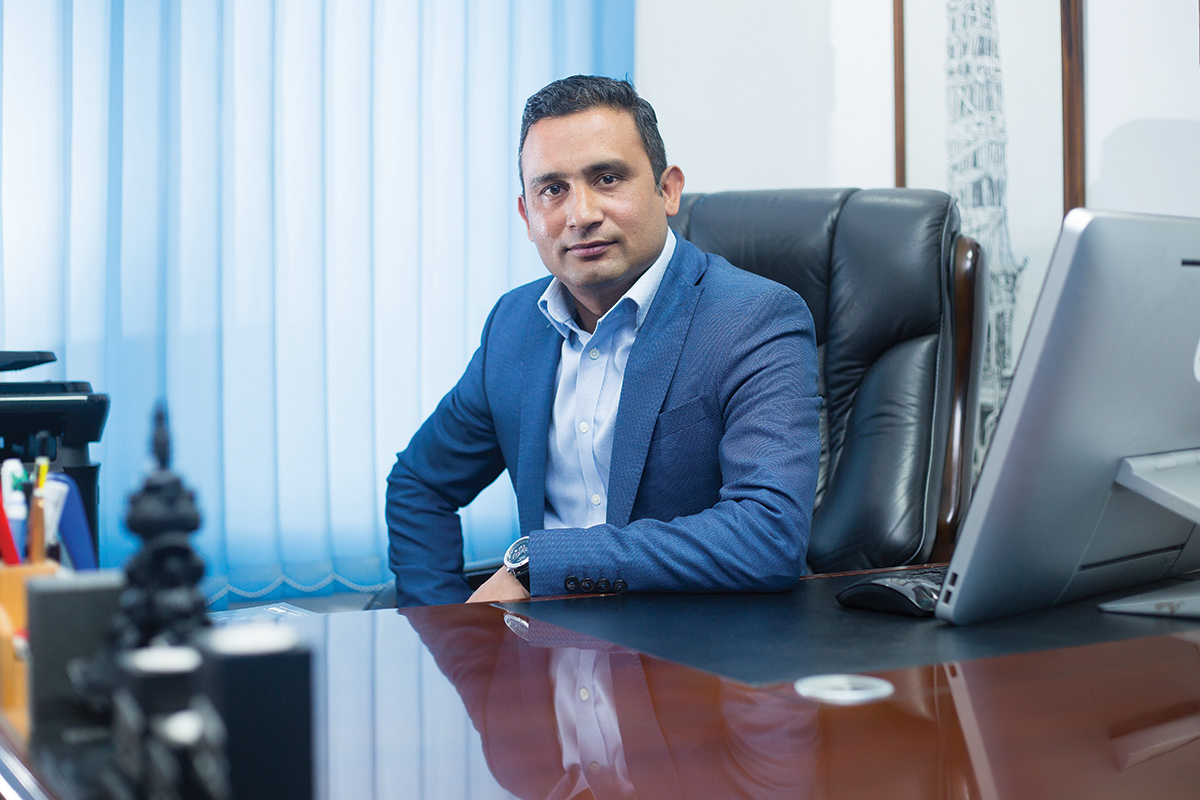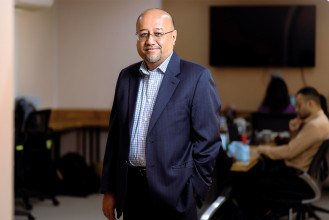
Text by Ujeena Rana
Sulav Budathoki has walked a long path that started working as a lab assistant. Today he is Chairperson of the same institution. His is a story of hard work, passion, vision, daring and competence. This is a story of how he did it.
Leap of Faith
Informatics College was started by a group of chartered accountants which partnered with an organisation in Singapore called Informatics Education Limited that provided UK degree to third parties. In 1999, the IT training center where Sulav Budathoki was studying led him to the vacancy at Informatics. “Students were few and the college was situated at Harihar Bhawan. I started working as a lab assistant.” That was the beginning of a life journey for Budathoki.
Bent on growth, he was not content with his work trajectory. He had bigger dreams and greater passion to succeed in life. “At that time, JAVA Programming and Oracle were considered tough to accomplish. In 2000, I learnt JAVA Programming on my own and started work as a trainer. I also self-trained myself in Oracle.” But being an autodidact was not enough; he needed a certificate. He went to Bangalore to study and earn certification for Oracle. “I became the second certified professional in Oracle 9i database administration in Nepal,” he claims. On returning, job offers from development and teaching fields awaited him as there was a dearth of qualified IT personnel in the country.
By 2007, we had almost 600 students. It was the same year that Informatics Education Limited, Singapore decorated us with two awards in Highest Growth Performance and Academic Performance categories from its 140 colleges spread in 23 countries.
Meanwhile, Informatics College went into auction towards the end of 2002. Every single item was priced on a piece of paper: chairs were listed at Rs.50 each, IT hub switches which then cost Rs.70,000 were being sold at Rs.3000 each. Try as he might, he could not decipher the reason for this debacle. But he knew that in this lay an opportunity for him. He took the leap of faith. From being a spectator in the institutional circus transpiring in front of him; he chose to become a participatory force. “I asked my friend Ravi Phuyal (still a Director at Islington) to back me on my decision,” shares Budathoki. “He was ready to move to the US, but I asked him to give me three years. I needed the moral back up and he gave it to me.” Together he and Ravi announced the takeover. It was 2003 and they had only six students in that institute. “However, we had not yet legally acquired the company,” he reminisces.
When he and Ravi approached the management, they were shown the door as they were yet reluctant to sell the company. “I put forth a proposal,” he says. He asked for a year time. By the end of the year, he assured them that operations would be streamlined and new students enrolled. This was the condition that would allow him to takeover.
Work started. But there were too many hiccups. “When we took over, the situation was so bad that out of the six students, annual fee of three had already been collected. That left us with only three fee paying students. A year of study at that time cost Rs. 51,000. One year rental of the college was due. Staff members were not paid. That was the mess we had offered to get into and sort out,” he recalls. A year later, they had 30 students. They approached the management again about acquisition. “They declined our offer outright. Instead, they wanted us to take it on lease for 10 or 15 years. The proposition did not interest me. I declared that I was quitting. But we renegotiated. Finally, they quoted a price:50 lakhs. That was a colossal amount; way more than someone like me from an average family could afford to pay,” he narrates.
Budathoki was not ready to relinquish his goal that easily though. When he and Ravi left the room, they had a deal. They would pay Rs 75 lakhs instead; but over three years. But 25 lakhs had to be paid immediately and the first installment was paid with loans from family.
Ironing out the wrinkles
A major issue Budathoki had to tackle was the deteriorating relation with Informatics Education Singapore. “The top management in Singapore wanted to shut us down. So they sent someone here to audit us.” This was when they had somehow just managed to pay the first installment of the takeover. The financial situation was so poor that they did not even have the money to entertain the visitor. They did what had to be done. “We had almost 60 students by then. We told them that if they paid the annual fee now, they would get a 50% discount. We managed to collect Rs 3-4 lakhs, talked to the Singaporean representative and shared our vision. She appeared convinced,” he recalls. In fact, when she went back, she talked to the top management in Singapore on our behalf. Things started normalising thereafter. “By 2007, we had almost 600 students. It was the same year that Informatics Education Limited, Singapore decorated us with two awards in Highest Growth Performance and Academic Performance categories from its 140 colleges spread in 23 countries,” he states.
This encouraged Budathoki to expand to Pokhara. However, problems with Informatics Singapore were recurrent; fluctuation in fee structure was one major issue. They would change it whenever and however much they fancied. “Students were getting the UK university degree but they were not getting the feel. The exposure was not there. I realised then that working with an intermediary won’t work in the long run.” This is when Budathoki went to UK to talk to the universities there directly. “I approached five universities. None agreed to work with us. This was in 2009. However, one university agreed to send their professors to check us out. But we failed miserably. They advised us to not to think of bringing a UK University in the next 20 years,” he recalls. This was because according to them, nothing was in Informatics Nepal’s favor - the pedagogy, lecture tutorial workshop, lecture halls. We had missed the mark on every front. “They asked us to show our white spaces. We had no clue what white spaces were. There was a huge difference between UK standards and our standard.”
It was then Budathoki felt the urgent need to transition, but he didn’t have UK university experience neither did Ravi. Only very few faculties had UK qualification. They knew they couldn’t do it alone. They needed someone who could transform the institute. Meanwhile, Informatics Singapore appointed a new Managing Director, Dr. Benson Soong. The business development officer in Singapore wanted Budathoki to meet with the new MD. “I went to Singapore and met him. We even signed an MoU. A fee was fixed. I was pleased with the deal. In a moment of euphoria I even wrote an optimistic Facebook status. As soon as I reach Kathmandu, I received a message from Benson saying that the management did not agree and the MoU wouldn’t work. The message also read that he was quitting Informatics. I realized that this man is something. I went back to Singapore to meet Benson. I asked him to give three years to my institution to help me usher an educational revolution in Nepal.” But it was not an easy task persuading Benson who had completed his PhD from Cambridge and had offers awaiting him from prestigious organisations. “The team from Singapore intervened in every aspect of our organisational structure. I worked under them. The first year, 2010, were the toughest for me as I struggled to match my energy with theirs. They were supremely efficient. If I slowed down they would remark that I was not serious enough. So I had to be my best self 24/7. They completely changed the system in the first year. We had to fire many people; even some of my close friends. I told Benson and his team: you make the decisions, I will execute,” he reminisces.
From Informatics to Islington
By the end of 2010, when the college standards had improved, they approached the same five UK universities. This time Budathoki went to the UK with Benson. Backed by professionals with Dr. Benson overseeing as Academic Head, Kelvin Ng as Operations Director, and Patrick as Business Development Officer, Budathoki had a strong case. Each of the universities agreed to partner however they picked London Metropolitan University since they had to start immediately, needed a fee structure closer to home, and required maximum support, informs Budathoki.
However, London Met had a condition. They would not work with an external brand, Informatics Singapore. “Our problem was that we had invested huge amounts in promotion and branding of the name, Informatics. But the university wanted us to change the institute’s name. We hit standstill. But we had no choice but to address this condition. One of the campuses in London Met has a posh street named Islington. So Informatics became Islington in the beginning of 2011,” he narrates.
Islington, at present, has 2200 students.

The challenges continue
Another hurdle came in 2012 when Islington was starting to experience exponential growth and unmatched success. London Metropolitan University faced a setback. Theresa May was Home Secretary then. The government endorsed a strict stand against immigrants and by extension, overseas students. Also, partly due to its own flaw, London Met got suspended. Many international students’ attendance had not been fulfilled; the university was supposed to report the attendance to the Home Office, but due to some administrative hassle, they had not. London Met was suspended on the grounds of overseas students. Until the matter was made clear, the university could not intake international students. “That was unfortunate because we had worked so hard to make Islington the first choice of students. The incident mired our pace to a great extent. Our competitors, on the other hand, had field day. They did not miss a chance to exploit the situation. Messages floated from rival colleges that London Met is blacklisted. Journalists used to crowd our institution for clarification and interrogation. We used our PR and the media supported us by disseminating the message that the impact is on the University only and it is a temporary suspension; therefore, nothing would happen to Islington students.” Strangely, our students proved to be our strongest allies. They supported us throughout. They were unmoved by charges from all fronts,” he recalls. When things cleared up, Islington experienced further growth.
When I took over Informatics, my dad was really mad at me. In Nepal, at that time, I was being offered 70,000 plus salaried job and almost a lakh annual pay offer from the US. Rejecting this was beyond my father’s comprehension. But now he is proud of me.
A changed scenario
In 2013, a new college was opened in Biratnagar. In 2015 and 2016, three more colleges were included in the list. In Kathmandu, they acquired Herald College and collaborated with local partners in Pokhara and Itahari to open up colleges there. Budhathoki shares that expansion outside the capital was a conscious effort. “We might suffer in the initial years but eventually those cities are growing markets. Secondly, we don’t want to tag ourselves as just business people. We are social education entrepreneurs. Additionally, we received multiple proposals from outside Kathmandu to establish Islington-esque colleges in their towns and cities”.
Entrepreneur to the core
“I am a risk-taker. I take calculated risks. An onlooker may, however, consider me mad,” he admits. He says that hunger is the recipe to becoming a successful entrepreneur. He admits, “hunger grows with time. I have 400 plus employees at present, I want to make it a thousand. If you rigorously work to fulfill your hunger, things align automatically. Everything pales in comparison to your drive, energy and relentless effort.”
The success that he has attained, leading multiple colleges across the country and making a successful business is not an overnight story. He credits it to dedication. His work is his meditation and he is engrossed in his work so much so that at one point in his life, he did not know what age his children were.
“Opportunities look very scary from the front but is bald from the back. I have been able to identify opportunities. There is no better place than Nepal for opportunities since no one has done anything. Therefore, it leaves room for anyone to come in and improve and better things. Those who want to create and do things creatively and differently, opportunities are aplenty here,” he remarks.
Sulav is the quintessential self-made man. He, however, credits his family support for helping him catapult his destiny. He also gives high priority to grit; the unfettered determination.
Personal life
Budathoki comes from an average family. His father’s salary was hardly enough to sustain the academic fees of both Sulav and his brother.
“When I took over Informatics, my dad was really mad at me. In Nepal, at that time, I was being offered 70,000 plus salaried job and almost a lakh annual pay offer from the US. Rejecting this was beyond my father’s comprehension. But now he is proud of me,” he says.
“Behind every successful man, there is a woman. In my case, there are two women; the first is my mother, the second and now more importantly is my wife. She has suffered more than me through my professional hurdles, single handedly taking care of our home and family. I have missed my children growing up,” he laments. Budathoki did not have any weekends on his calendar for years. However, by his own admission, now he invests more time on family matters.
Investment in education
It is said that the only thing more expensive than investing in education is not investing in education. Responsibilities double fold in this sector. “One should be ready to sacrifice oneself in the mission to better the future of the youngsters,” opines Budathoki.
Look at the ongoing trend as colleges and hospitals get established, it is easy to understand that people are ready to spend money on quality education and health. Understandably, investment pours in primarily these two sectors. Budathoki calls education a responsible business. He says, “Profit is needed to satisfy stakeholders, to hold onto world-class business professionals to work with. Academic sector is not like manufacturing industries which will return the capital in a certain number of years. Therefore, big corporations, big names investing in education is a positive sign, however, investment has to be responsibly done. Mere profit motive will not sustain an educational institute”.
Innovate Nepal Group (ING) is a private organisation established in 2015. “We realised the need to become a group. We registered ING as an investment company for common branding. ING is the parent company of Islington College and Herald College (Kathmandu); Merryland College Biratnagar; Itahari International College; and Informatics College Pokhara. “In Islington we have 100% share. Merryland we have almost 100% share but few locals are there. When doing business outside, we have active local partners. Moreover, local politics, local affairs are difficult to handle from Kathmandu. Because we trust our local partners, more students trust us. For those reasons, we decided to have local partners outside Kathmandu. Protecting the college and creating awareness is the local partners’ work. Operations is what we take care of. The fundamental operation is done from Kathmandu,” he informs. The core values of Islington that is being replicated across all colleges under ING are: teaching pedagogy, being student centric, and flat hierarchy.
A constant topic of debate is fee structure. Budathoki states, “The fees in Nepal look expensive to guardians and parents, but compared to other countries, higher education is cheapest in Nepal unless it is government subsidied. In our case, our university says that the fee you are charging is not sustainable. They have another college in Sri Lanka, lower performing than us, they are charging double. For a three year course, the cost is more than one crore if one studies in the UK. Here, they are doing it at Rs.10 lakhs out of which almost 40-45% is university fee. We have not raised our fee since we started Islington.”
The future
A few minutes in his company and one is injected with passion for life, the zeal to want, and the will to make it happen. His passion is infectious. If everything goes to plan, Budhathoki is set to play a major role in revolutionising the education sector, more specifically in how education is provided in the near future. For that one project, he has halted further work on multiple projects. Plans are in place to introduce Hotel Management at Islingston College, besides, expansion to Kohalpur, Butwal and Chitwan is on hold till 2023. Their next project focus is in agriculture and the ground work has been laid. “These projects will materialise but all my focus is centered on one project,” he says. He wants to make a bigger impact; not just cater to few thousands but to hundreds of thousands. The idea is to merge technology and education. “It is premature to discuss right now but know that something big is coming,” he concludes.





-1757917838.jpg)